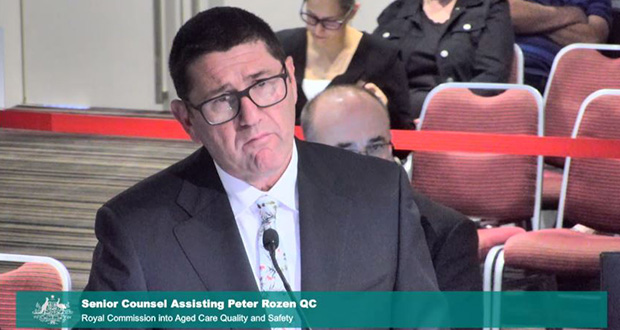Royal commission urges mandatory staff minimums, better pay for aged care

The royal commission has urged the aged care sector to reform its approach to the workforce, with counsel assisting Peter Rozen telling those gathered that “the time for action … is now”.
At the third Adelaide hearing, Rozen handed the commission a submission made by the counsels assisting which said that the sector should be subject to mandatory minimum staffing requirements and to make sure there is an RN on duty for every shift, among other recommendations.
“The staff in our aged care homes … are not well paid. All too often, there are not enough of them to provide the care that they would like to; for example, to sit and have a chat over a cup of tea,” Rozen told the commissioners.
“Many work in stressful and sometimes unsafe workplaces, some are untrained, and others have inadequate training. As a community, we owe these workers a lot.”
The submission also states that RNs and NPs should make up a greater proportion of the workforce, that regulated care workers should be registered and show a minimum qualification level, and that all aged care workers should be better paid and trained.
Rozen stated that, ultimately, change in the sector will occur only if those in leadership positions change their approach to aged care.
“The organisations for which they work should be better managed and better governed. And finally, the Australian government should provide practical leadership in relation to all these things,” he said.
The submission has been welcomed by the Australian Nursing and Midwifery Federation (ANMF), which has for a long time called for minimum staffing levels and nurse to patient ratios.
ANMF federal secretary Annie Butler said: “On behalf of our members working in aged care, the ANMF welcomes Mr Rozen’s practical recommendations put forward to the royal commissioners.
“As we’ve heard from our members in aged care and in the harrowing evidence from residents and their families, workforce issues, particularly inadequate staffing levels, have been the cause for much of their pain and suffering.
“The ANMF supports Mr Rozen’s recommendations to mandate the minimum numbers of nurses and qualified care staff that would be rostered, ensuring better, safer, continuity of care for residents.
“Better wages, training and regulation would also improve the retention and recruitment of the beleaguered aged care workforce.”
Aged & Community Services Australia (ACSA) agrees that workforce levels need to be addressed and said that the sector will need additional resources to raise overall numbers.
“ACSA supports a star rating system in principle, provided it doesn’t create a two-tiered system,” said ACSA chief executive Pat Sparrow.
“The proposed system includes a range of staff and occupations and acknowledges that residents have different needs which require different levels of support and skill combinations, which will also better reflect and support the increasing acuity of residents.”
ACSA said that were the aged care sector to implement a star rating system, for residents to receive at least a four-star level of care would mean an increase of 37.2 per cent in total staffing.
“ACSA strongly supports comments that additional resourcing is required to achieve this increase in staffing,” Sparrow said.
“What we know now is that aged care simply isn’t funded to provide the level of care people expect and deserve. A new direction like this could be exactly what we need to force a rethink and set up Australia for our ageing population and the decades to come.”
Leading Aged Services Australia (LASA) agreed that raising staff levels is not possible in the current system, but disagreed with the recommendation to implement mandated minimum staffing requirements, suggesting this may hinder innovation in the sector.
“We agree with counsel assisting’s observation that realising more staff in aged care is not possible under the current funding system,” said LASA chief executive Sean Rooney.
“The problem is that the average aged care operator struggles to cover their current costs at existing funding levels. We have long advocated for funding for good quality care be linked to the cost of delivering good quality care, including a reasonable financial margin, to maintain viability.
“Achieving the best quality care is paramount, and we note that more staff can only be implemented with adequate funding.
“At the same time, we proposed in our submission to the royal commission that staffing numbers be aligned to ‘if not, why not’ benchmarks that are a better alternative to a mandated minimum staff to resident ratio. We believe this approach warrants further attention.
“LASA supports increases in overall staffing levels in aged care facilities, and our sector tells us they want more staff who are well-skilled and well-paid,” Rooney said.
“But we need more funding to achieve this goal.”
In his concluding remarks, Rozen told the commission that poor conditions of employment, low staffing levels and poor training is why the sector is struggling with staff retention and attracting future workers.
“Most workers are on minimum award rates,” he said.
He quoted evidence given previously by the ANMF’s Paul Gilbert, who said that when it comes to staff numbers, it’s time “to stop kicking the can down the road”.
“Commissioners, counsels assisting agree with that observation,” Rozen said.
“We submit that if the goal of this royal commission is to make recommendations to achieve high quality, safe and person-centred aged care services, as it must be under the terms of reference, then the time for real action – on staffing numbers and mix, skill levels, remuneration, conditions of work and registration of the unregulated portion of the aged care workforce – is now.”
Email: [email protected]





